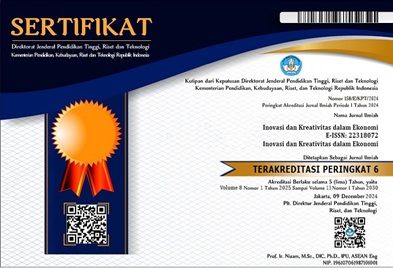SELECTING AND TRAINING HUMAN RESOURCES
Kata Kunci:
Seleksi, Pelatihan, Nilai Syariah, Al-Falah, MaslahahAbstrak
Manajemen sumber daya insani (SDI) dalam perspektif Islam menekankan integrasi nilai-nilai syariah dalam seluruh proses pengelolaan tenaga kerja, khususnya pada tahap seleksi dan pelatihan. Dalam konteks globalisasi dan transformasi digital, nilai-nilai seperti amanah, ihsan, maslahah, dan al-falah menjadi dasar pembentukan individu yang unggul secara profesional dan berintegritas secara moral. Proses seleksi berlandaskan prinsip keadilan (‘adl), kepercayaan (amanah), serta penolakan terhadap praktik suap (ghairu risywah) untuk menjamin sistem yang transparan dan adil. Sementara itu, pelatihan difokuskan pada penguatan karakter, etika kerja Islami, dan profesionalisme (etqan). Pemanfaatan teknologi seperti e-recruitment, AI screening, dan online testing turut mendukung efisiensi, namun tetap perlu diawasi dengan prinsip etika Islam agar tidak kehilangan dimensi kemanusiaan. Pendekatan pelatihan Islami melalui halaqah, magang, dan pembelajaran langsung dari ahli memperkuat pembentukan karakter dan kompetensi. Integrasi antara iman, ilmu, dan kerja nyata menjadi kunci dalam menghasilkan SDI yang kompeten, berkarakter mulia, serta berkontribusi pada kemaslahatan sosial dan keberlanjutan organisas.
Education is needed so that humans have good quality and are also creative. Facilities and infrastructure as well as educators have an important role in education. Indonesia has not achieved equality in the world of education, so the purpose of this paper is to examine the causes and solutions to the gap. The method used by researchers to write this paper is a qualitative research method using data collection techniques in the form of literature studies based on related journals. From the results of the study, researchers found five factors that cause gaps in education in Indonesia. First, the difficulty of access to schools. Second, lack of school facilities. Third, low interest and quality of teachers. This study is a study that examines educational inequality in schools located in remote areas as a real reflection of the challenges of developing the education sector in Indonesia. This study examines the form of educational inequality at Muara Jawa, Kutai Kartanegara Regency, East Kalimantan. And identify contextual and sustainable solution strategies. Using a descriptive qualitative approach, this study found that limited infrastructure, minimal access to schools, and lack of community interest in advancing surrounding schools are the main causes of the inequality that occurs. This study offers solutions based on collaboration between stakeholders, the use of simple educational technology, and strengthening local-based curriculum as an effort to bridge the gap. In writing this research article using qualitative methods, the data collection technique is in-depth interviews.





